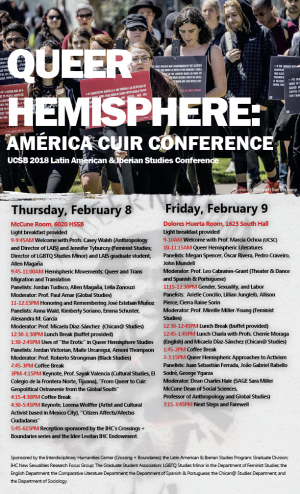Event Date:
Queer Hemisphere: América Cuir is a two-day conference (Feb 8-9) organized by Prof. Jennifer Tyburczy and graduate student Allen Magaña for the Latin American & Iberian Studies (LAIS) Conference. The events will bring together scholars from Mexico, Brazil, Peru, other Andean countries, as well as Latinx communities in the US, along with activists and performers, to analyze the challenges of studying gender and sexuality in the Americas, under the current threat of racist populism, state violence, and new forms of mobillization.
The conference will consist of 6 graduate student panels, two keynotes with esteemed guests Prof. Sayak Valencia and Lorena Wolffer (thank you IHC! and Crossings + Boundaries!), a welcome address with Prof. Marcia Ochoa (UCSC), and a charla with UCSB Professor Cherríe Moraga (English Department) and Prof. Micaela Díaz-Sánchez (Chicano Studies).
February 8, 2017, 9AM-5:30PM Events will take place in the McCune Room, 6020 HSSB
February 9, 2017, 9AM-4PM events will take place in the Dolores Huerta Room on the ground floor of South Hall. Many thanks to the Chicano Studies Department for generously offering that space for our conference.
Our conference theme is wholly informed by the Queer Hemisphere: América Cuir Working Group who writes about the larger QH project: "The hemispheric circulation of sexuality studies research has disproportionately showcased contributions of scholars in the global north, privileging already-dominant sites, subjects, and discourses. To counter the uncritical mainstreaming of US queer theory as the centered site and presumed subject of study, this conference will address how current debates concerning tensions between the rural and the urban, the public and the private, the center and the periphery, the productive and the reproductive, or the state and civil society might be differently and differentially articulated from queer and feminist of color perspectives that attend to both the geo-cultural specificities and the geo-historical entanglements that inflect relational scales of racial/sexual management."
All are welcome.




